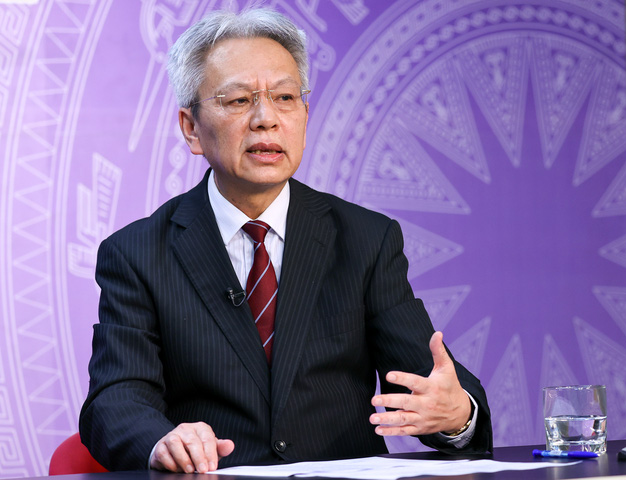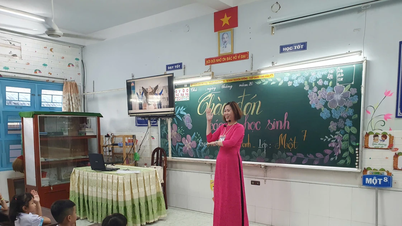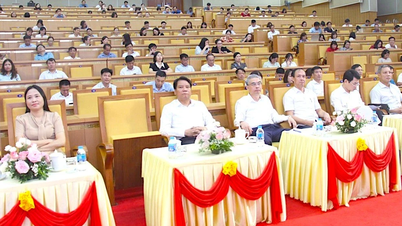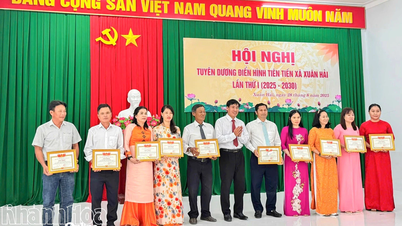 |
| Dr. Nguyen Si Dung said that the Law on Teachers has affirmed the independent legal status of teachers. (Source: VGP) |
A big step forward in terms of institutions
No education system can surpass the level of teachers. Teachers are always the central factor, the soul of all educational reforms. In the context of fundamental and comprehensive innovation in education and training, creating a transparent, modern and adequate legal environment for teachers is not only an objective requirement, but also a strong commitment of the State to those who are shouldering the mission of "cultivating people".
Before 2025, although the role of teachers has always been emphasized in legal documents, Vietnam still does not have a specific law that comprehensively regulates teachers. This makes the management of teachers inconsistent, the remuneration policy inadequate, and sometimes the honor and reputation of teachers are not properly protected.
Therefore, the passage of the Law on Teachers by the 15th National Assembly in June 2025 is an important milestone in the process of institutionalizing the human development strategy. This is not only a law on professions, but also a profound affirmation of the value and role of teachers in the cause of national development.
The Law on Teachers includes many chapters and provisions covering the entire process of teachers' practice from recruitment, training, fostering, use to policies on treatment, honor and handling of violations.
The subjects of application include teachers, lecturers, and educational administrators at all levels from preschool to university. The law regulates not only professional aspects but also core elements of professional ethics, competency standards, and protection of the honor and legitimate rights of teachers.
Five major content groups can be summarized as follows: First, professional standards and practice conditions: The Law clearly stipulates the conditions and standards to become a teacher; a framework of competency standards appropriate to each level of education and field of study; mechanisms for recognition, assessment and professional development.
Second, policies on the treatment and protection of teachers: Including special allowances, retirement regimes, rewards, and especially regulations on protecting the honor, dignity and rights of teachers when disputes, slander or insults occur.
Third , recruitment, use, and rotation: Schools and localities have more initiative in recruitment; there is a flexible mechanism for mobilizing teachers between schools and levels of education in accordance with practical needs.
Fourth, training, fostering and professional development: The Law encourages lifelong learning for teachers; promotes scientific research, international cooperation and continuous professional development.
Fifth, management and supervision responsibilities: Clearly define the roles of the Ministry of Education and Training and local authorities in teacher management; establish transparent monitoring, criticism and inspection mechanisms.
Professionalizing the teaching profession
The National Assembly’s first promulgation of a specialized law for teachers marked an institutional shift in the State’s perception and behavior toward this group. The Law on Teachers not only filled a long-standing legal gap, but also opened a new era for the professionalization of the teaching profession in Vietnam.
First of all, the law has affirmed the independent legal status of teachers. For the first time, teachers have been removed from the “shadow” of the Civil Servants Law and the Education Law to become a separate subject of regulation. This is a major institutional step forward, demonstrating the view that education is not only a public service, but also a special field that requires high standards of ethics, capacity and dedication. Teachers are no longer simply “knowledge transmitters”, but are the central subjects of the human development ecosystem.
 |
| Teachers today are not only the ones who “stand in class” but also the ones who guide students to explore the world, shape their personalities, and nurture their aspirations. (Photo: Nguyet Anh) |
Second, the law represents a breakthrough in the policy of protecting and rewarding teachers. In the context of the teaching profession increasingly facing pressure from society, the media and community expectations, clearly defining the responsibility to protect the honor and dignity of teachers is a profound humanistic highlight. At the same time, the law also expands the allowance policy according to the characteristics of the profession, region, working conditions and family circumstances. Establishing the highest salary position for teachers in the administrative and career sector is a strong affirmation that: honoring teachers cannot stop at words.
Third, the Law on Teachers focuses on continuous professional development, instead of the previous “once-for-life learning” model. Professional standards are no longer formal but are shaped as a tool for managing the quality of the team. Teachers have the right to lifelong learning, are encouraged to participate in scientific research, international cooperation and innovation in teaching methods. Thereby, forming a team of teachers who are proactive in learning, creative and adaptive – essential qualities of education in the digital age.
Fourth, the law has somewhat approached international standards for the teaching profession. Teachers are now not only “classroom teachers” but also people who guide students to explore the world, shape their personalities, and nurture their aspirations. A transparent management mechanism with reasonable hierarchy and control creates conditions for the open, flexible, and internationally connected education model to develop sustainably.
Overcoming challenges, building trust
Although the Law on Teachers opens up many expectations for innovation and professionalization of the teaching profession, fully and effectively implementing the law into life still faces many challenges.
First of all, many provisions in the law are closely linked to policies on wages, budgets and public finances – which are currently subject to the regulation of other legal systems such as the State Budget Law, the Civil Servants Law and regulations on salary reform that have not been completed. This makes some preferential and support policies in the law, although correct in theory, difficult to implement in practice without institutional synchronization and guaranteed resources.
At the same time, the capacity to organize and implement the law in many localities is still uneven, especially at the commune level - where primary schools and kindergartens are directly managed. Without specific guidance, adequate training and a strict monitoring mechanism, the law is at risk of falling into a situation of "hot above - cold below", meaning that the law is actively promulgated at the central level, but implementation at the grassroots level is slow, formal or off track.
Finally, some important contents such as the process of assessing professional standards, professional training policies, or the mechanism for mobilizing and rotating teachers are still framework-based and need to be specified by decrees and guiding circulars. If the issuance of sub-law documents is delayed, inconsistent or impractical, it will create legal gaps, causing confusion for implementing agencies and reducing the effectiveness of the law.
In order for the Law on Teachers to truly come into effect and play its role as a tool to build a team of professional teachers, it is necessary to synchronously deploy many solutions, including the following key orientations:
First, it is necessary to promptly and synchronously issue documents guiding implementation, especially decrees related to salary regimes, recruitment, assessment of professional standards and professional training. This not only helps to specify the regulations that are still framework in the law, but also creates a clear legal basis for localities to implement uniformly, avoiding misunderstanding or arbitrary application.
At the same time, it is necessary to organize extensive and systematic training for the team of education managers, principals, teachers and even district and commune management agencies. The goal is not only to grasp the content of the law, but more importantly, to understand the spirit of reform that the law aims for: putting teachers at the center, taking capacity development as the goal and promoting autonomy associated with accountability.
An important and fundamental solution is to build and develop a comprehensive digital data system on the teaching staff. From professional records, periodic assessment results to training and transfer processes, everything needs to be digitized, updated and interconnected to ensure transparency, modernity and efficiency in human resource management in the education sector.
In addition, it is necessary to encourage the participation of social and professional organizations, especially teachers' associations, in policy criticism and monitoring. Teachers themselves, when listened to and given feedback, will contribute to adjusting policies to be more practical, limiting the risk of administrativeization and formalization in the process of law implementation.
Finally, linking the implementation of the law with the roadmap for salary reform and improving working conditions for teachers is a key factor in determining success. The policies in the law will not be effective if teachers continue to struggle with low salaries, lack of public housing, high work pressure without adequate support mechanisms. Special priority should be given to preschool teachers and teachers working in remote areas – places that are having difficulty recruiting and retaining quality human resources.
The successful implementation of the Law on Teachers is not only an institutional success, but also a practical step to improve the quality of education, build social trust and inspire future generations of teachers - those who silently sow knowledge, build people and light up hope for the country.
Source: https://baoquocte.vn/luat-nha-giao-khang-dinh-sau-sac-gia-tri-cua-nguoi-thay-trong-su-nghiep-phat-trien-dat-nuoc-319354.html



![[Photo] National Assembly Chairman Tran Thanh Man holds talks with New Zealand Parliament Chairman](https://vphoto.vietnam.vn/thumb/1200x675/vietnam/resource/IMAGE/2025/8/28/c90fcbe09a1d4a028b7623ae366b741d)

![[Photo] Red flag with yellow star flutters in France on National Day September 2](https://vphoto.vietnam.vn/thumb/1200x675/vietnam/resource/IMAGE/2025/8/28/f6fc12215220488bb859230b86b9cc12)
![[Photo] Politburo works with the Standing Committee of Cao Bang Provincial Party Committee and Hue City Party Committee](https://vphoto.vietnam.vn/thumb/1200x675/vietnam/resource/IMAGE/2025/8/28/fee8a847b1ff45188749eb0299c512b2)

![[Photo] General Secretary To Lam attends the opening ceremony of the National Achievements Exhibition](https://vphoto.vietnam.vn/thumb/1200x675/vietnam/resource/IMAGE/2025/8/28/d371751d37634474bb3d91c6f701be7f)

































































































Comment (0)